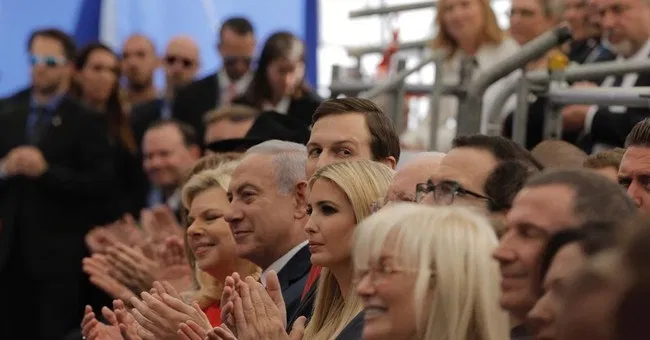
Recently I published two articles about the exciting news of President Trump’s latest Middle East peace success to wit, Bahraini and Arab Emirati recognition of Israel’s right to exist and the beginnings of formal diplomatic relations. This brings to 4, the number of Arab League countries recognizing Israel, doubling the number who did so when President Trump took office.
Read: Opinion: President Trump Brokers The First Arab-Israeli Peace Accord In 26 Years; Is Middle East Peace At Hand?
Read: Opinion: Trump “Amateur” Diplomacy Shows That Establishment “Experts”…Aren’t
In my Monday piece, I made quick mention about the New York Times giving a minor nod to Jared Kushner, President Trump’s son-in-law and point man on U.S. initiatives with the Arab League. Before I get into that, let’s look back at a couple mentions of Kushner by the Times, from back in February of 2017:
Mr. Kushner, on something of a crash course in diplomacy, has been speaking with Arab leaders in recent weeks. But he is a mystery to most Middle Eastern officials. He has no experience in government or international affairs. His up-close exposure to the Arab world amounts to little more than trips to a handful of Persian Gulf countries and a star-studded jaunt to Jordan.
Further down in the article:
Now Mr. Kushner has given up his life in New York for a government ID card and a groaning portfolio. Many foreign policy experts wait their entire careers for a White House job, but Mr. Kushner is fielding inquiries from foreign leaders even as he is still learning to navigate the subject. He is far from the first American Jew with strong ties to Israel to wade into Middle Eastern diplomacy — Rahm Emanuel, the former White House chief of staff, is the son of a former Jewish paramilitary fighter — but the others were Washington professionals or seasoned negotiators.
Read: For Kushner, Israel Policy May Be Shaped by the Personal
The New York Times tweet promoting that article, seemed a little more pointed:
Can Jared Kushner, a 36 year old real estate heir with no diplomatic experience, pull off peace in the Middle East? https://t.co/2bl58qFqsi
— NYT Politics (@nytpolitics) February 11, 2017
The New York Times wasn’t the only source casting doubts on the appointment of Jared Kushner to be the U.S. point man on Arab-Israeli peace efforts. The more strident voices on the left continuously excoriate Kushner and his position within the White House, as nothing more than a spoiled little rich boy riding on his father in law’s coattails.
Fast forward to 2020 just last month, Thomas Friedman of the New York Times walked back his paper’s concerns about Kushner’s inexperience and ability to get the job done. Here’s the lede and pertinent parts regarding Kushner
The Israel-United Arab Emirates deal will be felt throughout the region.
To fully appreciate why, you need to start with the internal dynamics of the deal. It was Trump’s peace plan drawn up by Jared Kushner, and their willingness to stick with it, that actually created the raw material for this breakthrough. Here is how.
The Kushner plan basically called for Israel and the Palestinians to make peace, with Israel being able to annex some 30 percent of the West Bank, where most of its settlers were, and the Palestinians getting to establish a demilitarized, patchwork state on the other 70 percent, along with some land swaps from Israel.
Here is the best part, emphasis mine:
So what Trump, Kushner, Prince Mohammed bin Zayed, the de facto leader of the Emirates, and Netanyahu did was turn lemons into lemonade, explained Itamar Rabinovich, one of Israel’s leading Middle East historians and a former ambassador to Washington.
“Instead of Israeli annexation for a Palestinian state, they made it Israeli non-annexation in return for peace with the U.A.E.,” said Rabinovich in an interview. Kushner, he added, “basically generated an asset out of nothing, which Israel could then trade for peace with the U.A.E. It was peace for peace, not land for peace.”
read: A Geopolitical Earthquake Just Hit the Mideast
If you recall retired General Jack Keane’s comment regarding a geopolitical paradigm shift, Rabinovich takes that a step further by asserting that Jared Kushner essentially created a diplomatic negotiating asset out of thin air. That certainly isn’t the act of a rookie diplomat. Crediting Kushner in print is a huge compliment coming from the New York Times—even more significant given that his success has been long derided by the left, as nothing more than the end result of his silver spoon upbringing.
As the Middle East peace process continues to successfully unfold under the leadership of the President’s point man Jared Kushner, honest folks will have to revise their initial opinions of him. I’ve never been a huge fan of nepotism. That was my biggest issue with JEB! and his ill fated attempt to turn the Republican nomination process into a Bush dynastic effort. Kushner appears to be the exception that proves the rule. Even the New York Times is oh so reluctantly admitting such. Presidential son in law and special advisor Jared Kushner, long derided for his youth and inexperience, but now with his success in the brutal arena of Arab-Israeli peace negotiations, may have just changed all of that.







